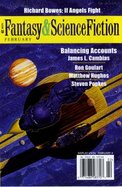
| Editor: | Gordon van Gelder |
| Issue: | Volume 114, No. 2 |
| ISSN: | 1095-8258 |
| Pages: | 162 |
Both the fiction and the non-fiction were better than average this issue. The highlight of the non-fiction is an excellent book review by Elizabeth Hand that focuses on new translations of classics of imaginative literature. Charles de Lint's review column is also better than normal (new Gaiman!), and Lucius Shepard has a wonderfully snarky opening to his movie review.
"Balancing Accounts" by James L. Cambias: I love SF stories told from the perspective of machines, particularly less humanoid machines such as (in this case) a cargo ship. It's a great way to use the SF technique of estrangement and make the reader look at the universe from a different perspective. This was a particularly enjoyable example, following the adventures of a cargo ship and its run-in with one of the rarest and most demanding of creatures, a human being. Cambias takes Asimov's Laws of Robotics, turns them up several notches, and then shows them from the perspective of an otherwise independent ship, which adds just enough of a disturbing edge for spice. (7)
"Retrospect" by Ann Miller: This slow-developing story starts out as a quiet character tale about bibliophiles and the art buying business, and not until near the end is one privy to the SF twist or the true point of the story. Despite the slow pace of the plot, it had me engrossed from the start, with just enough mystery to lead me along as Miller taught me to appreciate what the characters appreciate. The payoff is quite satisfying, particularly given the final twist ending that will put a smile on the face of any lover of certain classics. This was probably the best story of the issue. (8)
"Memoirs of the Witch Queen" by Ron Goulart: Goulart is generally good for the occasional off-the-wall fluff story full of unbelievable characters and fun with cliches. This story about a ghost-writer who is working on a book with a witch is no exception. The witch starts meddling in his life to improve it, with rather dramatic results given the degree of power involved. Good for a smile and maybe a chuckle. (6)
"Petri Parousia" by Matthew Hughes: This is neither a Henghis Hapthorn nor a Guth Bandar story, unlike nearly everything by Hughes that shows up in F&SF. Instead, it has a contemporary setting and a plot built around an unlikely but amusing development of DNA technology: the ability to clone any arbitrary ancestor of a person. Hughes plays this for its commercial potential, which stays mildly amusing throughout the story while setting the reader up for a magnificent groaner of an ending. One of the better shaggy dog stories I've read in a while, although it takes a while to get to the punchline. (6)
"Bread and Circus" by Steven Popkes: Soccer played by teams of dinosaurs is a great idea, and to the extent this story is about taking that idea at face value and writing about the coach, it's a lot of fun. To the extent it's about a rather maudlin treatment of domestic relations, it left me cold. Mostly, that means I could have done without the ending, or for that matter the wife. The rest of the fairly short story is fun idea play with a great parody of football commentators. (6)
"Philologos; or, A Murder in Bistrita" by Debra Doyle & James D. Macdonald: This is the one miss of the issue for me. It's an historical supernatural fantasy centered around rare texts of magic and a bit of demon hunting. It's good enough for what it is, but it's played entirely straight and contains little I haven't seen before. Mostly of interest to people who love the tone and setting of 19th century eastern Europe. (5)
"If Angels Fight" by Richard Bowes: Another thoughtful story built around an interesting premise. Bowes plays with the idea of a spark of competence and energy in a family dynasty, in this case a political one modelled after the likes of the Kennedys, and makes it literal. The spark has a consciousness and independent existence of its own and can move between people. The first-person narrator is a long-time family friend and grew up with the black sheep son in whom the spark manifested, and the story tells of his effort to arrange a family reunion. Interspersed with the main story are flashbacks telling the family history. Bowes does a good job of taking a metaphor literally and making it both plausible and a bit eerie, without ruining it with excessive explanation. (7)
Reviewed: 2008-03-12